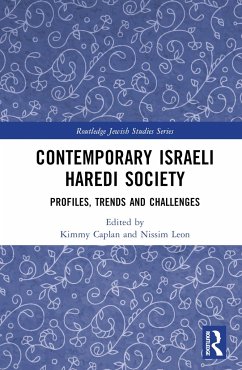This edited volume offers profiles of contemporary Israeli Haredi (i.e., Jewish Ultra-Orthodox) society from several disciplinary points of view, resisting a generalized approach and examining the different, sometimes competing currents, that define it.
It is argued that Haredi society has undergone a process of rejuvenation in recent history: demographically, it has experienced steady and consistent growth; on the Israeli political stage, Haredi parties have become increasingly influential; and culturally, the Haredi presence is increasingly felt in Israeli news media, popular movies, and TV series. Each of the chapters in the book focuses on a particular topic and combines research findings with an assessment of the current state of the field. These topics encompass Haredi ideology, politics, military service, education, geography, the media, and healthcare - together, they paint a complex picture of Haredi society as one of contradictory layers, dimensions, and aspects.
Making sense of contemporary Haredi society is critical for anyone interested in understanding Israeli society as a whole, but the book will also appeal to historians of religion, scholars of contemporary conservative enclave religious societies and cultures, and those who focus on Jewish studies in the modern era.
It is argued that Haredi society has undergone a process of rejuvenation in recent history: demographically, it has experienced steady and consistent growth; on the Israeli political stage, Haredi parties have become increasingly influential; and culturally, the Haredi presence is increasingly felt in Israeli news media, popular movies, and TV series. Each of the chapters in the book focuses on a particular topic and combines research findings with an assessment of the current state of the field. These topics encompass Haredi ideology, politics, military service, education, geography, the media, and healthcare - together, they paint a complex picture of Haredi society as one of contradictory layers, dimensions, and aspects.
Making sense of contemporary Haredi society is critical for anyone interested in understanding Israeli society as a whole, but the book will also appeal to historians of religion, scholars of contemporary conservative enclave religious societies and cultures, and those who focus on Jewish studies in the modern era.
"Contemporary Israeli Haredi Society is an invaluable resource for scholars, activists and policy makers keen to know more about the extraordinary currents reforming Israeli Haredi society and, by implication, Israeli society as a whole. It provides a productive framework and rich roadmap, illuminating the scholarly state of affairs across key disciplines and issues, including politics, space, education, and media. Comprehensive in scope and accessible in prose, this volume provides a timely, solid and essential addition to the study of Haredi Jewry in one of its critical moments."
Michal Kravel Tovi, Associate Professor of Anthropology, Tel-Aviv University
"The numerical and political visibility of Haredi Jews is increasing in various countries, including the United States, the United Kingdom, France and, especially, Israel. Their increased numbers spurred an increasing need to understand them within the context of the societies in which they live. This is especially the case with respect to Haredim in Israel, where they now constitute approximately 13 precent of the country's total population and approximately 17 percent of its Jewish population.
The editors of this volume assembled a group of scholars of Israeli Haredim specializing in a variety of significant areas, including ideology, politics, education, army service, mass media, health and medicine, to provide a comprehensive volume which lucidly introduces and analyzes contemporary Haredi society in Israel. This is a basic volume for anyone interested in gaining a deeper and more accurate understanding of Haredim, Haredi society in Israel and its interactions with the larger society."
Chaim I. Waxman, Professor of Sociology, Hadassah Academic College, Jerusalem
Michal Kravel Tovi, Associate Professor of Anthropology, Tel-Aviv University
"The numerical and political visibility of Haredi Jews is increasing in various countries, including the United States, the United Kingdom, France and, especially, Israel. Their increased numbers spurred an increasing need to understand them within the context of the societies in which they live. This is especially the case with respect to Haredim in Israel, where they now constitute approximately 13 precent of the country's total population and approximately 17 percent of its Jewish population.
The editors of this volume assembled a group of scholars of Israeli Haredim specializing in a variety of significant areas, including ideology, politics, education, army service, mass media, health and medicine, to provide a comprehensive volume which lucidly introduces and analyzes contemporary Haredi society in Israel. This is a basic volume for anyone interested in gaining a deeper and more accurate understanding of Haredim, Haredi society in Israel and its interactions with the larger society."
Chaim I. Waxman, Professor of Sociology, Hadassah Academic College, Jerusalem

